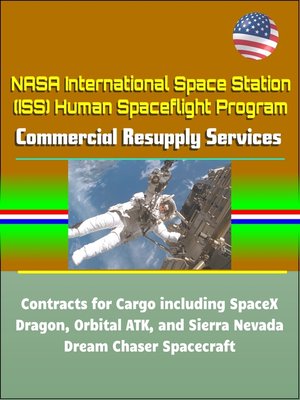NASA International Space Station (ISS) Human Spaceflight Program
ebook ∣ Commercial Resupply Services Contracts for Cargo including SpaceX Dragon, Orbital ATK, and Sierra Nevada Dream Chaser Spacecraft

Sign up to save your library
With an OverDrive account, you can save your favorite libraries for at-a-glance information about availability. Find out more about OverDrive accounts.
Find this title in Libby, the library reading app by OverDrive.



Search for a digital library with this title
Title found at these libraries:
| Library Name | Distance |
|---|---|
| Loading... |
This excellent report has been professionally converted for accurate flowing-text e-book format reproduction. Released in April 2018, this report by the NASA Office of Inspector General, Office of Audits, examines the latest contracts for commercial resupply services to the International Space Station.
Since the Space Shuttle's final flight in 2011, NASA has embarked on a new approach to transport supplies, equipment, and science research to and from the International Space Station (ISS or Station) using private companies. Through its first round of Commercial Resupply Services contracts (CRS-1), NASA awarded a total of 31 missions to Orbital ATK and Space Exploration Technologies Corporation (SpaceX) worth $5.9 billion, or an average cost of $191.3 million per mission.1 As a follow-on to CRS-1, NASA awarded a second round of cargo resupply contracts known as CRS-2 to Orbital ATK, SpaceX, and the Sierra Nevada Corporation (Sierra Nevada) with a maximum total value of $14 billion - more than double the value of the CRS-1 contracts. As of December 2017, NASA has awarded $2.6 billion in task orders for eight CRS-2 missions and related integration costs.
Cargo missions are key to the successful utilization of the ISS and continued reliance on commercial operators to provide this vital service could play a major role in NASA's future plans as it searches for cheaper and more efficient methods to explore space. Costing more than 30 percent of the ISS Program's annual budget, NASA officials view the commercial resupply contracts as successful and cost effective. In this audit, we examined the CRS contracts for resupplying the Station through 2024 with a special emphasis on the CRS-2 contracts. Specifically, we examined (1) the extent to which CRS-2 contracts provide best value to NASA, (2) CRS-2 costs, and (3) technical and schedule risks to CRS-2 contractors. In meeting these objectives, we reviewed applicable Federal laws, regulations, and guidelines; evaluated NASA's CRS contracts; interviewed officials from NASA and the commercial companies; analyzed spending on CRS; and reviewed relevant documentation.







